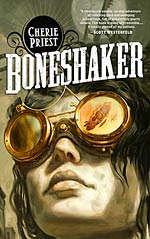
![]() Birgitte SB
Birgitte SB
7/6/2011
![]()
Zeke is that age when he can no longer live with his mother's refusal to speak of her lawman father, who famously died while saving the lives of prisoners. Nor without answers about his own dead father, whose infamy is so certain that Zekes dares not even ask. Answers which lie in walled off Seattle which has been abandoned his entire life. Abandoned, excepting the drug pushers, Chinamen, and zombies of course.
I found Boneshaker to be very poorly done. The frame was a riduculous attempt to paper over the author's inability to handle exposition. The next thing that really irked me was the sloppy blocking, the author seemed to not even try to keep track of who was present to recieve specific information outside of plot points. Once the something was admitted, any random character will respond would the knowledge. Boneshaker, however, endeavored to make me forget this annoyance proving to be a much worse book than one were such a failing is worth remarking. The secondary characters, which are flimsy two-dimensional stock, still manage to give a much stronger sense of personality than the protagnists. The two protagonists, or rather it seemed like about six, as the various versions of Briar & Zekes Willkes that were portrayed could not coalesce into merely a pair of sane characters. Frankly, Briar and Zekes barely seemed to exist outside of the authors need for them to react to the plot. They were entirely implausible.
Worst of all was the dialogue. The endless loops of "understanding" and "sympathy" bandied about without any subtance competed with inane inquiries and explanations of they were just about to do next for what almost made me close the book unfinished. If there had been any outstanding quality to Boneshaker, perhaps I would have hated it too much to finish. As it was, the novel was readable enough that I had to find out what happened while not really caring if Briar & Zeke became zombies.